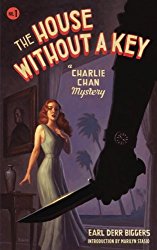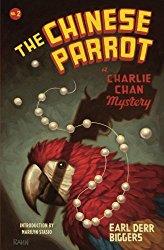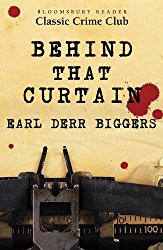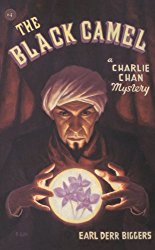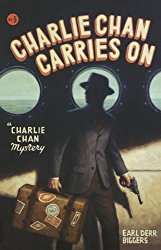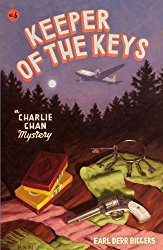Charlie Chan's Family as
Described in the Books
Many of us think of Keye Luke as “Charlie Chan’s number one son, Lee.” This, of course, is because he was thus portrayed in a number of movies. However, the early films are faithful to the books. (“Charlie Chan Carries On”, for example, identifies Chan’s eldest son as “Henry.”)
In “Charlie Chan Carries On,” after Inspector Duff is shot in Chan’s office, Chan calls home. The movie script quotes Charlie:
|
(Grabbing phone—giving number) Two Blue 186—hello?—this you, Henry? Honorable father speaking. I sail half-hour on steamship Prescot. Kindly omit surprised feelings—pack bag with amazing speed—tooth-brush—other suit—razor. Bring bag with honorable mother to dock. Thank you so much. |
The House Without a Key
(This is a link through which I make a small commission if you buy. See here for more details.)
In the first novel, The House Without a Key, Chan meets John Quincy Winterslip, who is from Boston. The two become friends and, although they are independently investigating the murder of Daniel Winterslip, they often meet and discuss the case.
In The House Without a Key, Chapter XVI, Chan mentions his wife and children:
|
"Here on gleaming sand I first regard my future wife," continued Chan. "Slender as the bamboo is slender, beautiful as blossom of the plum—" "Your wife," repeated John Quincy. The idea was a new one. "Yes, indeed." Chan rose. "Recalls I must hasten home where she attends the children who are now, by actual count, nine in number." |
Later, when John Quincy Winterslip visits Chan’s home, he becomes conscious of their cultural differences and is, at first, a little uncomfortable. As we are told in The House Without a Key, Chapter XIX:
|
Charlie Chan lived in a bungalow that clung precariously to the side of Punchbowl Hill. Pausing a moment at the gate, John Quincy looked down on Honolulu, one great gorgeous garden set in an amphitheater of mountains. A beautiful picture, but he had no time for beauty now. He hurried up the brief walk that lay in the shadow of the palm trees. A Chinese woman—a servant, she seemed—ushered him into Chan's dimly-lighted living-room. The detective was seated at a table playing chess; he rose with dignity when he saw his visitor. In this, his hour of ease, he wore a long loose robe of dark purple silk, which fitted closely at the neck and had wide sleeves. Beneath it showed wide trousers of the same material, and on his feet were shoes of silk, with thick felt soles. He was all Oriental now, suave and ingratiating but remote, and for the first time John Quincy was really conscious of the great gulf across which he and Chan shook hands. "You do my lowly house immense honor," Charlie said. "This proud moment are made still more proud by opportunity to introduce my eldest son." He motioned for his opponent at chess to step forward, a slim sallow boy with amber eyes—Chan himself before he put on weight. "Mr. John Quincy Winterslip, of Boston, kindly condescend to notice Henry Chan. When you appear I am giving him lesson at chess so he may play in such manner as not to tarnish honored name." The boy bowed low; evidently he was one member of the younger generation who had a deep respect for his elders. John Quincy also bowed. "Your father is my very good friend," he said. "And from now on, you are too." Chan beamed with pleasure. "Condescend to sit on this atrocious chair. Is it possible you bring news?" "It certainly is," smiled John Quincy. He handed over the message from the postmaster at Des Moines. "Most interesting," said Chan. "Do I hear impressive chug of rich automobile engine in street?" "Yes, I came in the car," John Quincy replied. "Good. We will hasten at once to home of Captain Hallet, not far away. I beg of you to pardon my disappearance while I don more appropriate costume." Left alone with the boy, John Quincy sought a topic of conversation. "Play baseball?" he asked. The boy's eyes glowed. "Not very good, but I hope to improve. My cousin Willie Chan is great expert at that game. He has promised to teach me." John Quincy glanced about the room. On the back wall hung a scroll with felicitations, the gift of some friend of the family at New Year's. Opposite him, on another wall, was a single picture, painted on silk, representing a bird on an apple bough. Charmed by its simplicity, he went over to examine it. "That's beautiful" he said. "Quoting old Chinese saying, a picture is a voiceless poem," replied the boy. Beneath the picture stood a square table, flanked by straight, low-backed armchairs. On other elaborately carved teakwood stands distributed about the room were blue and white vases, porcelain wine jars, dwarfed trees. Pale golden lanterns hung from the ceiling; a soft-toned rug lay on the floor. John Quincy felt again the gulf between himself and Charlie Chan. But when the detective returned, he wore the conventional garb of Los Angeles or Detroit, and the gulf did not seem so wide. They went out together and entering the roadster, drove to Hallet's house on Iolani Avenue. |
The Chinese Parrot
(This is a link through which I make a small commission if you buy. See here for more details.)
In The Chinese Parrot, we learn that Charlie now has ten children. Chapter XVI tells us:
|
He [Bob Eden] hurried to his room. Chan had built a fire in the patio, and was sitting before it, the warm light flickering on his chubby impassive face. When Eden returned with his hat, he paused beside the detective. "Getting some new ideas?" he asked. "About our puzzle?" Chan shook his head. "No. At this moment I am far from Madden's ranch. I am in Honolulu where nights are soft and sweet, not like chilly desert dark. Must admit my heart is weighed a little with homesick qualms. I picture my humble house on Punchbowl Hill, where lanterns glow and my ten children are gathered round." "Ten!" cried Eden. "Great Scott–you are a father." "Very proud one," assented Chan.
|
Behind That Curtain
(This is a link through which I make a small commission if you buy. See here for more details.)
In Behind That Curtain, Charlie, who had come to the mainland in the previous book, is in San Francisco, preparing to return home. In Chapter II, he tells Miss Morrow:
|
"I fear I am victim of crude philosophy from Orient. Man—what is he? Merely one link in a great chain binding the past with the future. All times I remember I am link. Unsignificant link joining those ancestors whose bones repose on far distant hillsides with the ten children—it may now be eleven—in my house on Punchbowl Hill." |
The Black Camel
(This is a link through which I make a small commission if you buy. See here for more details.)
In The Black Camel it is confirmed that Charlie, indeed, now has eleven children. In Chapter X, Charlie says, “Since I am now the father of eleven children, it is necessarily some time since I went about with head in clouds and warmly beating heart.”
The Black Camel, Chapter XIII (“Breakfast With the Chans”), gives us a lengthy scene which shows us Charlie’s relationship with some of his children and with his wife:
|
It was a far from silent house that lay about him. Eleven children in one family make of early morning something of a bedlam. He heard their voices here, there and all about, shouting, expostulating, laughing and, in one case at least, weeping bitterly. With a comfortable feeling that the day had begun as usual, he prepared himself for his tasks. In the dining-room he found that his three eldest children were lingering about the table, and as he entered, he saw them regarding him with a keen interest he had not aroused in that quarter for a long time. They all spoke at once, and he realized the cause of their interest. One of their heroines, according to the morning paper, was murdered, and they were going to see the miscreant punished or know the reason why. "Quiet!" Charlie cried. "Can a man think beneath a tree filled with myna birds?" He turned to his oldest son, Henry, dapper in college-cut clothes and engaged in lighting a cigarette. "You should be at the store." "Going right along, Dad," Henry replied. "But say—what's all this about Shelah Fane?" "You have read it in the paper. Some one most unkindly stabbed her. Now, get on to your work." "Who did it?" said Rose, the oldest girl. "That's what we want to know." "A few others languish in same fix," her father admitted. "You're on the case, aren't you, Dad?" Henry inquired. Charlie looked at him. "In Honolulu, who else would be summoned?" he asked blandly. "Well, what's the dope?" went on Henry, who had been Americanized to a rather painful extent. "When do you grab the guilty party, and what's his name?" Charlie again looked at him, and sighed. These children were his link with the future—what sort of future, he often wondered. "As I have frequent reason to point out, your language is sadly lacking in dignity," he reproved. "I have not yet apprehended the wrong-doer, and as a consequence, I do not know his name." "But you will, won't you, Dad?" Rose put in. "You're not going to fall down on it, are you?" "When have I ever so much as stumbled?" he wanted to know. She was smiling at him mischievously. "Now, Dad—" "When I was youthful," Chan broke in hastily, "it was regarded deadly sin to question all-pervading wisdom of father. He was honored and respected by children. Such a hint of failure as you have just offered would have been impossible." She got up and came round to him, still smiling. "Times have changed. You're not going to fail, of course. We all know that. But this is one case your family is really interested in. So move fast, won't you? Don't take too much time out for oriental meditation." "Should I pause to think deeply," he replied, "I would be plenty lonesome man in this new world." Rose kissed him and went out on her way to the bank where she was employed during the summer vacation. Henry stood up languidly. "Will you be wanting the car to-night, Dad?" he inquired. "If I ever wanted it, to-night will be the time," his father answered. Henry frowned. "I guess I'll have to buy one," he said. "I can get a good second-hand bus on the installment plan—" Charlie shook his head. "Work—and pay your way as you go," he advised. "Then you need fear no midnight knock upon the door." "Old stuff," replied Henry, and made a leisurely exit. Evelyn, aged fifteen, was addressing him. "Gee—I thought Shelah Fane was swell. I saw her in some swell parts." "Enough!" cried Charlie. "Vast English language is spread out before you, and you select for your use the lowliest words. I am discouraged." His wife appeared with his oatmeal and the tea. She was a jolly-looking woman, nearly as broad as Chan, with a placid smiling face. If her children and her husband had far outdistanced her in the matter of adjustment to a new land, she was, judging from her calm eyes, not at all distressed. "Heah about Shelah Fane," she remarked. "Plitty tellable thing." "What do you know about Shelah Fane?" Charlie asked, surprised. "All time chillun make talk, Shelah Fane, Shelah Fane," his wife said. "I think mus' be velly fine woman. I want you catch bad man plenty quick." Chan choked on his hot tea. "If I do not, I perceive I am expelled from my own household. May I respectfully ask that you give me time. Much work to be done on this case." "Mebbe you have moah tea," his wife suggested. He drank a second cup, and then rose from the table. Evelyn brought his hat; they all seemed eager to speed him on his way. At the door he barely avoided falling over a round-faced little boy with keen black eyes that recalled those of his father. "Ah—the small Barry." He lifted the child and gave him an affectionate kiss. "Every day you grow more handsome, like fine namesake, Mr. Barry Kirk. Be good boy, now, and do not eat the plaster." He went out and got his car, and as he drove down the hill he thought about his children. He had always been proud of the fact that they were all American citizens. But, perhaps because of this very fact, they seemed to be growing away from him—the gulf widened daily. They made no effort to remember the precepts and the odes; they spoke the English language in a manner that grated on Charlie's sensitive ear.
|
Charlie Chan Carries On
(This is a link through which I make a small commission if you buy. See here for more details.)
In Charlie Chan Carries On, Charlie receives a letter from Inspector Duff, with whom he has kept a correspondence since they worked on a case together in Behind That Curtain. He responds (Chapter I):
|
"How kind of you to burden great mind with inquiry for my children. Summing up quickly, they number now eleven. I am often reminded of wise man who said: To govern a kingdom is easy; to govern a family is difficult. But I struggle onward. My eldest daughter Rose is college student on mainland. When I meet for first time the true cost of American education, I get idea much better to draw line under present list of offspring and total up for ever. "Once more my warmest thanks for plenty amiable letter.” |
Keeper of the Keys
(This is a link through which I make a small commission if you buy. See here for more details.)
In Keeper of the Keys, Chapter II, Charlie is in Lake Tahoe. At one point he is “thinking of his own eleven children at home in Honolulu.”
In Chapter IV, he refers to his children when he explains why he is reticent to draw a hasty conclusion on the case he is currently working.
|
Chan shrugged. "I am merely putting facts on parade. I find it wise not to draw conclusion too rapidly. We get answer too quick, we may be wrong, like my children who labor with algebra. I leave it open for present.” |
In Chapter XIV, he says to Sheriff Holt, “Pardon vile slang, which I acquire from my children, now being beautifully educated in American schools.”
Scenes and descriptions of Charlie Chan and his family are carried into the films. Some scenes and themes are embellished. Some common scenarios include Chan complimenting his children when he is proud of them, criticizing them when their as-yet amateurish attempts to help him solve a case actually interfere with his progress and frustrate him, Chan paying for their “expensive American education” only to hear them using slang or playing hooky. See "Charlie Chan’s Family as Shown in the Movies" for examples.
(This is a link through which I make a small commission if you buy. See here for more details.)
